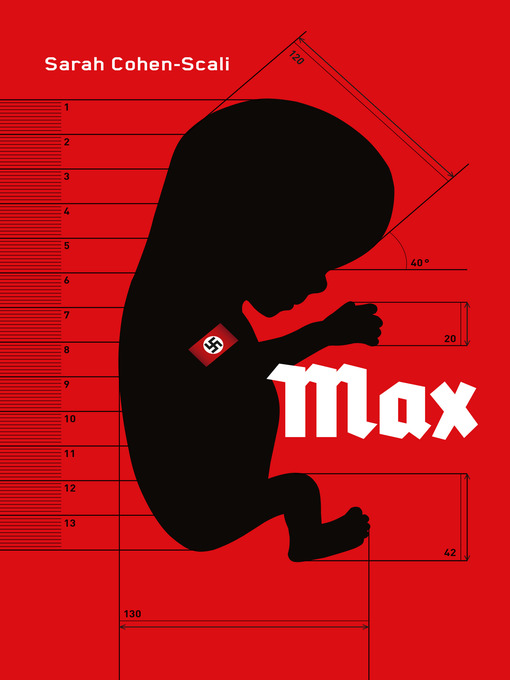
Max
فرمت کتاب
ebook
تاریخ انتشار
2017
Lexile Score
760
Reading Level
3-4
نویسنده
Penny Huestonناشر
Roaring Brook Pressشابک
9781626720725
کتاب های مرتبط
- اطلاعات
- نقد و بررسی
- دیدگاه کاربران
نقد و بررسی

December 19, 2016
French author Cohen-Scali’s U.S. debut chronicles the rise and fall of the Third Reich through the eyes of a child. Konrad von Kebnersol (dubbed Max by his birth mother) is a product of Lebensborn, a top-secret Nazi eugenics program designed to propagate the Aryan race. Baptized by Hitler and raised by the Nazi Party, Max serves as bait to aid in the kidnapping of Polish children, then enrolls at the Kalish school to facilitate the abductees’ Germanization. There, Max meets Lukas, an older boy to whom Max bears a striking resemblance. The two become like brothers, so it’s a shock to Max when Lukas confides that he’s Jewish. Unfortunately, Cohen-Scali’s plot relies too heavily on coincidence, and Max’s narration lacks nuance (even as a fetus, he narrates like a mustache-twirling villain); although Lukas’s relationship with Max forms the book’s emotional core, Cohen-Scali waits 200 pages to introduce him. The novel endeavors to teach an important lesson about the indoctrination and exploitation of German youth, but excessive exposition and an awkward structure muddy the message. Ages 15–up.

bigsmoke - sounds like it would be a good book

February 1, 2017
The education of a young Nazi, from fetus to 9-year-old.One of the lesser-known Nazi atrocities, the Lebensborn program, aimed to increase the numbers of so-called Aryans; the program encouraged sexual contact between SS officers and unmarried (sufficiently blonde) white women while also Germanizing 200,000 kidnapped European children. Max is a fictional Lebensborn child, born in 1936 of unmarried parents. He begins his narrative in utero, determined to be born on April 20, the Fuhrer's birthday. Platinum blond and with icy blue eyes and a perfectly Aryan dolicephalic head, he plans to become an ideal Nazi, full of Draufgangertum--a hotheaded lack of self-preservation. As a fetus and an infant, Max's point of view is that of an adult true believer, full of grotesque crudeness, endless sexual violence, and unremitting anti-Semitism. He's eager to serve the Reich, even as a toddler, and he gladly helps his eugenicist keepers identify appropriately Nordic-looking children to kidnap. Though he's intellectually convinced of Hitler's philosophies, Max's visceral discomfort with Nazi atrocities expresses itself through stomach troubles (described in scatological detail). A dysfunctional friendship with a blond, blue-eyed teenage Polish boy with a terrible secret only accelerates Max's poor digestion. After a slow start, readers will find Max's story reminiscent of M.T. Anderson's National Book Award-winning The Pox Party (2006). Horrific atrocities--and the ghastly realities of any war--seen through the eyes of a child with heartbreaking cognitive dissonance pack a wallop. (Historical fiction. 15-18)
COPYRIGHT(2017) Kirkus Reviews, ALL RIGHTS RESERVED.

February 1, 2017
Gr 9 Up-Chilling and thought provoking, Cohen-Scali's novel contemplates the legacy of Lebensborn, Hitler's mandated mating of "racially pure Aryan" men and women. With a touch of magical realism, Konrad begins his first-person narrative in utero with hateful and articulate speeches, reflecting a maturity well beyond his years. He is a Lebensborn child, and his internal monologue is that of an unapologetic, sociopathic white supremacist. Konrad witnesses the horrors of the Third Reich, such as the systemic raping of women, infanticide, and other atrocities, yet to him, they are simply part of life. As the model Aryan youth, he obediently follows orders and aids in the kidnapping of Polish children for "Germanization." Konrad's soul is thrown a lifeline when he enters Germanization school and befriends an older boy, Lukas, who soon reveals himself (only to Konrad) as Jewish. Lukas pities Konrad and sees the wounded child behind the hate speech he uses, and he tells Konrad that they must survive in order to bear witness. At the war's end, will he be Konrad, the indoctrinated Nazi, or Max, the child so lovingly named by his mother? To what will he bear witness? Readers are left with a horrifying question: Was Hitler's goal of raising young people to "terrify the rest of the world" attained? An author's note includes brief discussion of historical figures who appear in the book.
Copyright 2017 School Library Journal, LLC Used with permission.

Starred review from January 1, 2017
Grades 10-1 *Starred Review* Initiated by Heinrich Himmler in 1933, the Lebensborn program incentivized candidates to conceive, birth, and turn over their children, the Jungmanner, to the German state. Born on April 20 (Hitler's birthday), 1936, in Steinhoring, with fair hair, blue eyes, and a dolichocephalic head, fictional protagonist Konrad von Kebnersol is the premier product of Himmler's initiative. And after the departure of the doting mother who called him Max, Nazi propaganda consumes Konrad entirely. At four, he's recruited to assist in kidnapping Aryan-appearing children in Poland, and by six, he's enlisted at Kalish, a correctional school for stolen children. But when Konrad meets Lukas, a headstrong Jewish boy, the two form an unflappable bond that leads Konrad to doubt everything he once believed in. With its brazen cover art, unusual perspective (beginning with Konrad's first-person narrative, while still in utero), and occasionally obscene dialogue, this story, originally published in Francewhere it won the prestigious Prix Sorcieresis no doubt provocative. But Cohen-Scali straddles the lines between poignant and profane, humorous and horrific with extraordinary poise and unmistakable panache. Peppered with Polish and German phrasing and appended with an informative author's note, Konrad's musings, as wide-eyed as they are wise, are staggeringly singular. A heartrending portrait of unlikely friendship and fierce defiance, and an impeccably researched glimpse into a deeply disturbing point in history. Unforgettable, bizarre, and brilliant.(Reprinted with permission of Booklist, copyright 2017, American Library Association.)

























دیدگاه کاربران